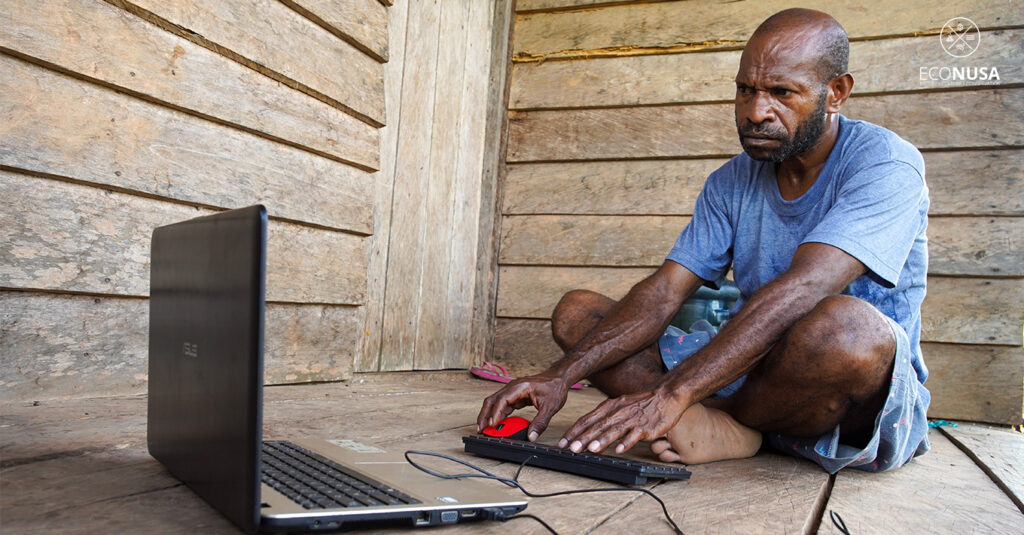
A number of villages in Merauke Regency, Papua Province, reorganizes their villages based on data. They tried to have self-sufficient food system since forest as their “supermarket” has long become memories to the locals. Forest has been changed into oil palm plantation. The indigenous people in Merauke bit by bit build village resilience so they would not release their own livelihood resources.
Billy Metemko, a resident of Bupul Village, Elikobel District, Merauke Regency, in Papua, said that development in Bupul failed to run optimally as it was not based on the fact in the village. consequently, the spending of village fund was simply on the estimate basis. “Village government has so far lacked knowledge on the exact number of population. It is just an estimation,” said Billy to EcoNusa.
Read also: Samb Kai Village School, Building Local Resilience in Merauke
He got the awareness on the importance of data center following his participation in Samb Kai Village School in Waninggap Nanggo Village in November 2020 in which 10 villages took parts. Billy was one of the four representatives of Bupul who were selected by the village chief. The 15-day Social Transformation School was held by EcoNusa in collaboration with INSIST. And Caritas Merauke. In addition, the village school also has organic farming class.
Data Center
In data center class, the participants of village school studied the data collection hardware such as drone, Global Positioning System (GPS), and data processing software such as Quantum GIS and Village Information System (Si Kampung) application. “It was the first time I used an application like Quantum GIS but the teacher’s method to address the instruction material was attractive and thus we are motivated,” said Billy.
There are three types of data that would be collected by village school students, namely social, sectoral, and spatial data. Social data deals with the community demographic data with in-depth level. Demographic data includes the number of person in a family, sex, education, profession, and blood type. The data center team also collected data on education, health, profession, up to village administration system.
Sectoral data is required to analyze food production causal with ecosystem surrounding the village. For instance, data on land size, type of soil, weather, source of water, available medicinal vegetation, cultural and historical sites, customary heritage, traditional arts, and road networks.
As to Billy, spatial data has crucial role to the community, particularly in Bupul that has been surrounded by oil palm plantation concessions. With spatial map, the community could identify local potential and defend their customary rights. “In the forest, there are lives, natural resources like fish, meat, medicine for utilization. There are many that we have not explored yet. If there is development, the community knows which part of their region,” he said.
Challenge
Among the participants, Billy and Hendrik J. Tanjai were in the data center team. Meanwhile, Wensislaus Agji and Rafael Mekiuw were in the organic farming team. They should share their knowledge to the community of Bupul. They could attract the other locals’ interest and spirit for development. The data center and organic farming teams have so far had 14 members each.
There are various challenges that made social data collection was only 80 percent. Pasificus, the former Bupul Village Head, said that data collection stopped a while due to respect to the mourning family. When there is departed family member, the bereaved family will have 40-day grieving time by staying idle at home.
The family will put on mourning bracelet made of wood skin on both arms. After grieving time, there is customary ceremony to cut off the bracelet. Bupul villagers call the procession Sal. “There were some peoples died of illness. In Bupul we are family, so we could hardly conduct data collection. We should respect a grieving time,” said Pasificus.
Ahmad Mahmudi, the instructor of Samb Kai Village School, said that data center system creation is one of the indicators to build local resilience. Data center serves as the basis of strategic policy making for village fund allocation. Based on the previous study prior to village school execution, Mahmudi found the fact that food consumption spending among the society is quite high.
“If the village government has data, food policy could be arranged. For instance, agriculture potential with more than twice harvests that could yield from two to three tons. The formulation for village strengthening is by sustaining income that comes into a village and it is spent for capital goods, production tools,” said Mahmudi.
Editor: Leo Wahyudi




